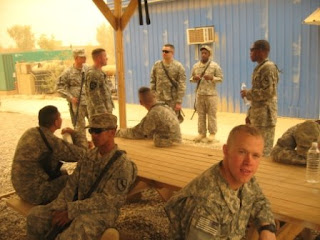ARLINGTON, Va. - Explosively formed penetrator attacks in Iraq are "way
down over the past couple of months," said the head of the Joint IED
Defeat Organization.
The number of EFPs that U.S. troops encountered in July was "in the
teens," Lt. Gen. Thomas Metz told reporters Wednesday.
"I think it's probably connected with Sadr's militia and his direction
to calm down," Metz said.
Widely known as "EFPs," the penetrators are a particularly deadly type
of roadside bomb that fire a slug of high density metal at a high
velocity, giving the penetrator much more power than roadside bombs of
similar size made from artillery shells.
Since he became head of JIEDDO in December, EFPs have made up between 5
percent and 10 percent of all roadside bombs per month, but they have
accounted for 40 percent of casualties, Metz said.
As with previous JIEDDO roundtables, no specific information was
provided on the number of roadside bomb attacks in Iraq and Afghanistan
due to security concerns.
Overall, the number of roadside bombs that U.S. troops encounter is down
more than 50 percent from its peak of between 2,800 and 3,000 per month,
Metz said.
As U.S. troops get better at jamming radio-controlled bombs, the enemy
in Iraq has shifted to low-tech means to set them off, such as pressure
plates and tripwires.
While such methods mean those who implant roadside bombs can be spotted
more easily, it also makes the job of stopping roadside bombs harder.
"It's still a very hard physics problem to be moving down the road at 30
miles an hour and have a device that can look into the ground and detect
at a very low false-positive rate, you know, a pressure plate that's
under there," he said.
While U.S. troops are dealing with fewer roadside bombs in Iraq, the
trend is going in the other direction in Afghanistan, Metz said.
After dropping off during the winter, the number of roadside bomb
attacks in Afghanistan has risen dramatically since the beginning of the
year, according to Wednesday's presentation.
During the peak of roadside bomb attacks this spring, coalition troops
encountered about 200 roadside bombs, resulting in about 40 casualties,
Metz said.
The increase is due in part to the presence of more coalition troops in
Afghanistan, he said.
Meanwhile, JIEDDO is counting about 300 "IED events" outside Iraq and
Afghanistan per month, underscoring the need to defeat IED networks as a
strategic threat, he said.
"I do not want every thug in the world to pick up on the fact that the
IED is his weapon of choice, because it'll come to the homeland, and I
don't want it in the homeland," Metz said.
By Jeff Schogol
Stars and Stripes
August 8, 2008






-765757.JPG)

-766497.JPG)

-767419.JPG)
-767619.JPG)



-769785.JPG)


-751297.JPG)
-751769.JPG)
-752171.JPG)
-752642.JPG)
-753135.JPG)
-753655.JPG)


.JPG)

.JPG)
.JPG)





